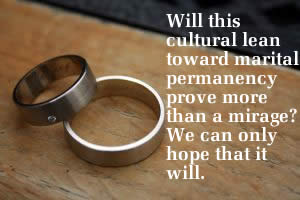Marital Loyalty
Editor’s Note: This article was reprinted with permission from Dan Miller’s book Spiritual Reflections. It appears here verbatim.
 The following caption in Sunday’s newspaper caught my attention: Old-fashioned, long-lasting marriage is suddenly trendy. In the article that followed, Baltimore Sun columnist, Cheryl Lu-Lien Tan, presented evidence of a trend toward marital commitment among pop-culture icons.
The following caption in Sunday’s newspaper caught my attention: Old-fashioned, long-lasting marriage is suddenly trendy. In the article that followed, Baltimore Sun columnist, Cheryl Lu-Lien Tan, presented evidence of a trend toward marital commitment among pop-culture icons.
Tan noted, for instance, that actor Brad Pitt was voted “2000’s Sexiest Man Alive” by People magazine. Indicating a shift in cultural perspective, Pitt attained this distinction not as an eligible bachelor but as newly-wed to Jennifer Aniston. One of Pitt’s female co-stars expressed the new perspective this way: “There’s something gorgeous about his commitment” (Star Tribune, January 21, 2001).
Beyond the popular scene (which seems to change with each wind that blows), there is mounting evidence of a broad-scale interest in marriage. Sociologists are discovering in their research what popular authors are beginning to declare in writing: marriage commitment is on the rise.
According to Tan this trend may be attributable to a new generation of young adults emerging from the rubble of homes destroyed by divorce. Disillusioned by their parents’ experience, younger adults appear more appreciative of the inherent benefits of holding fast to one’s marriage vows.
Will this cultural lean toward marital permanency prove more than a mirage? We can only hope that it will. To this end, I offer three proposals which may at least generate meaningful dialogue. God knows our culture needs to rethink marriage, as a generation of suffering children would readily attest.
First, we must learn to enter marriage more carefully. Couples who pursue marriage should submit to preparatory counsel of reasonable length and depth. They need to be forewarned of the gale-force winds that will inevitably rock the boat of marriage—their marriage—and they need to be equipped with specific skills to survive those strong winds.
The drive-through wedding parlors of Las Vegas fame are a mockery of titanic proportions. Something is wrong when a marriage is granted to a couple by a total stranger, without witnesses, in less than five minutes! The location and length of a marriage ceremony is of no particular significance, but the lack of sufficient preparation for a marriage thus contracted should deeply concern us all. I will not even address the asinine practice of marriage by popular opinion polls conducted with alarming frequency on reality TV shows these days.
We must recognize that marriage is an institution of immense risk with wide potential for either deep joy or devastating sorrow. It is vital then, that those entering such a relationship prepare well. Our state government requires divorced and legally separated couples to submit to counsel. How much more energetically should we assume this same responsibility in preparation for matrimony.
Second, we must recover a sense of the sacredness of marriage vows. The “for better or for worse” vow which married couples often take has come to mean: “I’ll hang around as long as it’s better, and bail out as soon as it gets into the ‘worse’ range.”
I do not mean to make light of the suffering some endure at the hand of their mate. Nonetheless, our culture needs a fresh realization that a vow of loyalty to one’s spouse is a sacred promise, the keeping of which constitutes a test of one’s character and honor. If we make such a pledge, we must keep it, “for better or for worse,” realizing the sizeable implications, not only for personal honor and family stability, but for the overall health of our culture as a whole.
Third, we must see marriage as a life of death to self-orientation (Ephesians 5:21-32). While this may sound frightening—and should—such a perspective opens a door to immense joy in marriage. Conversely, self-orientation inevitably leads to a muted marital relationship if not to full-blown marital meltdown.
During my college days, I remember reading the works of Robertson McQuilken. I knew by experience this man was an able theologian and gifted leader. I did not realize until recently that he is also an extraordinary husband. In God’s providence McQuilken has poignantly epitomized these aforementioned principles in his relationship with his wife, Muriel.
In the early 1980’s, Muriel was diagnosed with Alzheimers disease. As an author, international speaker and executive, Robertson’s work was obviously compromised by his wife’s condition.
For twenty-two years, McQuilken served as President of the thriving Columbia Bible College and Seminary. He was at the height of his career. What should he do? In his book, A Promise Kept, McQuilken describes his struggle to choose between continuing his ministry and institutionalizing his wife, and leaving the ministry to care for Muriel full-time at home.
One thing was certain; he would honor his marriage vows. He would love and cherish his wife “for better or for worse … in sickness and in health.” As he labored to provide physical care for his ailing spouse, it became increasingly evident that he alone could ease her troubled mind. At the pinnacle of his life’s work, he wrote the following letter to his constituency:
Twenty-two years is a long time. But then again, it can be shorter than one anticipates. And how do you say good-bye to friends you do not wish to leave?
The decision to come to Columbia was the most difficult I have had to make; the decision to leave 22 years later, though painful, was one of the easiest. It was almost as if God engineered the circumstances so that I had no alternatives. Let me explain.
My dear wife, Muriel, has been in failing mental health for about 12 years. So far I have been able to carry both her ever growing needs and my leadership responsibility at Columbia. But recently it has become apparent that Muriel is contented most of the time she is with me and almost none of the time I am away from her. It is not just “discontent.” She is filled with fear—even terror—that she has lost me and always goes in search of me when I leave home. So it is clear to me that she needs me now, full-time.
Perhaps it would help you understand if I shared with you what I shared in chapel at the time of the announcement of my resignation. The decision was made, in a way, 42 years ago when I promised to care for Muriel “in sickness and in health … till death do us part.” So, as I told the students and faculty, as a man of my word, integrity has something to do with it. But so does fairness. She has cared for me fully and sacrificially all these years; if I cared for her for the next 40 years I would not be out of her debt. Duty, however, can be grim and stoic. But there is more: I love Muriel. She is a delight to me—her childlike dependence and confidence in me, her warm love, occasional flashes of that wit I used to relish so, her happy spirit and tough resilience in the face of her continual distressing frustration. I dont have to care for her. I get to! It is a high honor to care for so wonderful a person. (pp. 21-22)
Of his ongoing vigil over his ailing wife, McQuilken writes:
It’s more than keeping promises and being fair, however. As I watch her brave descent into oblivion, Muriel is the joy of my life. Daily I discern new manifestations of the kind of person she is, the wife I always loved. (p. 23)
May I suggest that the love of which McQuilken speaks is not a purely emotional, star-struck kind of love into which we precipitously fall. His is a love of deep commitment and self-sacrifice for the good of his wife. Indeed, of the popular lists of supposed marital needs (such as stimulating communication, understanding, affirmation, common interests, sexual fulfillment, etc.) McQuilken writes candidly: “there is an eerie irrelevance to every one of those criteria for me” (p. 31). This is the too seldom heard voice of genuine love.
As the McQuilkens have experienced, there are unspeakable joys found on the path of enduring marital fidelity. Not everyone will experience such joys, but such joys should at least be widely acknowledged and promoted. As they are, perhaps the next generation will experience more of them than has the present. Pray God it does.
 Dan Miller has served as senior pastor of Eden Baptist Church (Savage, MN) since 1989. He graduated from Pillsbury Baptist Bible College (Owatonna, MN) with a B.S. degree in 1984. His graduate degrees include an M.A. in History from Minnesota State University, Mankato, and M.Div. and Th.M. degrees from Central Baptist Theological Seminary (Plymouth, MN). He is nearing completion of D.Min. studies at Trinity Evangelical Divinity School (Deerfield, IL). Dan is married to Beth, and the Lord has blessed them with four children. Dan Miller has served as senior pastor of Eden Baptist Church (Savage, MN) since 1989. He graduated from Pillsbury Baptist Bible College (Owatonna, MN) with a B.S. degree in 1984. His graduate degrees include an M.A. in History from Minnesota State University, Mankato, and M.Div. and Th.M. degrees from Central Baptist Theological Seminary (Plymouth, MN). He is nearing completion of D.Min. studies at Trinity Evangelical Divinity School (Deerfield, IL). Dan is married to Beth, and the Lord has blessed them with four children. |
- 1 view
Anyway, I appreciate this tid bit of overlooked good news. Whether it proves to be a real trend or not, time will tell.
In the advice department, this especially resonated with me:
[Pastor Dan Miller] First, we must learn to enter marriage more carefully. Couples who pursue marriage should submit to preparatory counsel of reasonable length and depth. They need to be forewarned of the gale-force winds that will inevitably rock the boat of marriage—their marriage—and they need to be equipped with specific skills to survive those strong winds.
Views expressed are always my own and not my employer's, my church's, my family's, my neighbors', or my pets'. The house plants have authorized me to speak for them, however, and they always agree with me.
[Pastor Dan Miller] First, we must learn to enter marriage more carefully. Couples who pursue marriage should submit to preparatory counsel of reasonable length and depth. They need to be forewarned of the gale-force winds that will inevitably rock the boat of marriage—their marriage—and they need to be equipped with specific skills to survive those strong winds.Actually, this makes me smile. :bigsmile: my sister (married going on 10 yrs now) has said that premarital counseling should take place the first year AFTER marriage. Living through my first year of marriage, I totally agreed with her! (and yes, we had premarital counseling—it makes a lot of sense to me yrs later!! maybe that’s a good thing.)
Before marriage, i remember reading all these christian marriage books and thinking, who are these sick people? what is wrong with them?! Then i got married … and i went hunting for all those books! :p



Discussion